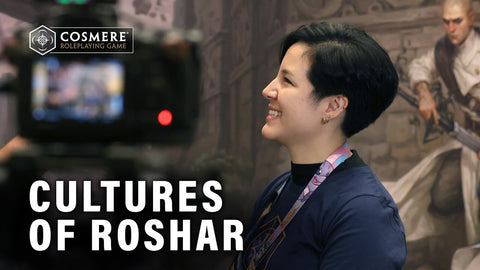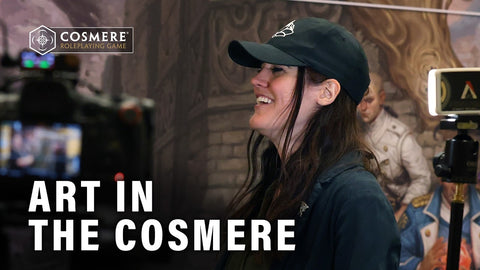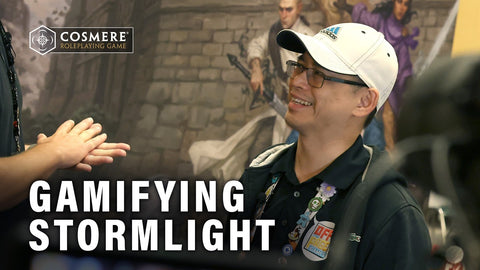The following interview includes paraphrased questions and answers to make it easy to scan through. These are not meant to be taken as direct quotes.
Q: Can you share your work history and how you got connected to the Stormlight RPG project?
Lydia: I've been working in TTRPGs for about four years, and I'm a newer member of the team. I got connected through Dan Wells and another IP I was working on. They knew I specialized in cultures, characters, and narrative frameworks, so that was my "in" for this project.
Q: How do you balance mechanics and narrative in the game?
Lydia: I’m part of the mechanics team, which is crucial because narrative and mechanics need to work in synergy. Brandon’s books have a lot of crunch built in, but he never neglects storytelling. That’s something we’ve tried to replicate in the game—ensuring the mechanics support the narrative and vice versa.
Q: What are you most proud of in terms of game mechanics?
Lydia: I’m really proud of the Heroic Paths! We have both Heroic and Radiant paths, and while the Radiants are crunchy and fun, the Heroic Paths allow you to dive deeper into the talent tree. It’s fascinating how you can rise from struggling circumstances to become a hero, with many different ways to achieve that. It adds so much to the storytelling experience.
Q: How do you balance power dynamics between characters with and without abilities?
Lydia: One of the coolest things is how goals help equalize everyone. Characters might have different roles and goals, and those goals can be side plots within the main story. The rewards you gain from achieving your goals are central to the narrative fabric. For example, a heroic character might seek to gain Dalinar as a patron or acquire a cool fabrial. Radiants might have powers, but they may not always have the political influence that a non-powered character could wield.
Q: What was it like writing in the world of Roshar?
Lydia: It was a total dream come true! Joining narrative meetings with Brandon was incredible. He gave us fantastic direction and was gracious in answering our many questions—some of which were pretty out there, like about sea silk in the world. It was so much fun to explore all the intricacies of the Cosmere with him.
Q: How did you approach writing for the Singers and other non-human cultures in the game?
Lydia: We approached the Singers as people, not just as another alien race. They have hopes, dreams, families, and their own culture. We wanted to humanize them without erasing their unique identity. Our motto was to give the same consideration to the Singers as we do to human characters. This was essential to making their culture feel authentic and respectful.
Q: How does the game handle cultural representation and marginalization?
Lydia: Brandon isn’t shy about including marginalization in his world, and he addresses it head-on. It’s important to have these conversations in the game as well. We thought a lot about how characters with privilege and power interact with those who are marginalized. One of my philosophies is that marginalized people should have the same opportunities as others. We wanted to ensure that the Singers, for example, were never just the punchline—they’re complex beings with their own stories to tell.
Q: For those who aren’t TTRPG players but are fans of The Stormlight Archive, what would you say to encourage them to try the game?
Lydia: If you’re a huge fan of The Stormlight Archive, you should definitely give the game a try! Don’t be afraid to be super creative—the system supports all types of stories. Whether you’re a seasoned TTRPG player or completely new, there’s something here for everyone.
Q: What expectations do you have for house rules that players might create?
Lydia: I foresee a lot of house rules popping up around the Surges! We worked closely with Brandon to unpick how the Surges work in the game, but I’m sure players will come up with creative and wacky ways to use them. There’s also potential for interesting spren-related rules during gameplay, especially for groups that are introspective and love world-building.
Q: How do you see players interacting with the world, and how does the world interact with them?
Lydia: It should definitely be a two-way interaction. As players engage with different cultures and characters, they’ll need to navigate the complexities of those interactions. No group of people is a monolith, so how characters handle cultural elements and respond to challenges will shape the story. It’s all about making the world feel dynamic and responsive to the players' choices.
Q: What’s an aspect of the game that you think isn’t being talked about enough?
Lydia: Scene types! We have conversations, endeavors (like exploration, pursuit, and mystery), and other unique scene types that add depth to the gameplay. Endeavors are my favorite because they allow for team-based problem-solving. For example, in one game, players had to cross a rough bridge, and some used Cohesion to fortify it while others tied extra ropes—it’s all about working together.
Q: How do you handle the limitations of Surges in the game?
Lydia: We developed some limitations around the Surges to keep things balanced. Beyond that, we wanted to explore what characters do when they’re out of Stormlight, or when they’re facing an internal crisis. How do they confront their misbeliefs or obstacles? That’s where the real storytelling happens—when they’re grappling with those dark moments.
Q: Any surprising stories from playtesting?
Lydia: One player rolled a complication just as a highstorm was about to hit. They tried to use the Surge of Transportation to dodge it but accidentally slipped into Shadesmar for a second. It’s been so much fun seeing how the elements of Roshar play out in these unexpected ways.
Q: How does the game handle Shadesmar?
Lydia: We have a section in the world guide dedicated to Shadesmar, providing GMs with tools to deal with characters who end up there. We hope the Kickstarter does well so we can further enrich the experience in Shadesmar and offer even more content for players to explore.




Comments (0)
There are no comments for this article. Be the first one to leave a message!